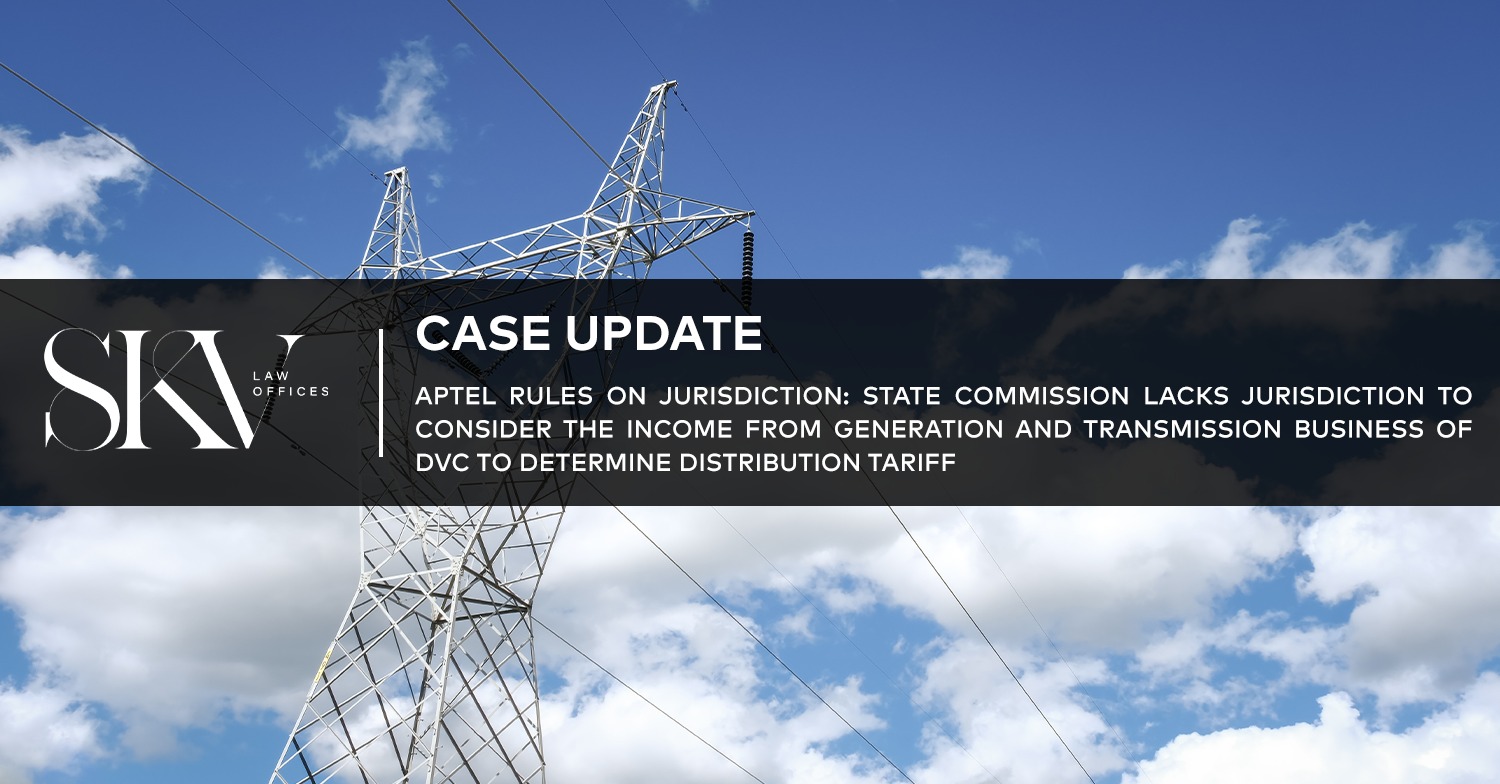APTEL Rules on Jurisdiction: State Commission Lacks Jurisdiction to Consider the Income from Generation and Transmission Business of DVC to determine Distribution Tariff
16.10.2024
The Appellate Tribunal for Electricity (“APTEL”) has passed an interim order dated 15.10.2024 in Appeal No. 332 of 2024, thereby granting interim relief to Damodar Valley Corporation (“DVC”) by staying the order dated 23.07.2024 (“Impugned Order”) passed by the Jharkhand State Electricity Regulatory Commission (“JSERC”) with respect of the re-determination of Non-Tariff Income (“NTI”) for DVC’s Distribution business for the period FY 2006-07 to 2011-12 in the State of Jharkhand.
The JSERC, by its initial determination, had included income from DVC’s generation, transmission, and other businesses in calculating the NTI for its distribution business in Jharkhand. This had led to a significant reduction in the Annual Revenue Requirement (“ARR”) and subsequently lower tariff for DVC for the period FY 2006-07 to 2011-12 in Jharkhand. DVC had challenged the initial determination, wherein APTEL was pleased to set aside and remand the initial determination by its order dated 05.02.2024 (“Remand Order”) and held that:
- JSERC overstepped its jurisdiction while determining the NTI for distribution tariff and considered the income generated from generation and transmission which is regulated by CERC.
- JSERC does not have jurisdiction to determine the income of Appellant arising from its businesses other than distribution in the State of Jharkhand.
However, in the Impugned Order passed in remand proceedings, JSERC again arbitrarily re-determined the NTI for distribution business considering income from generation and transmission business of DVC. Being aggrieved by the same, DVC challenged the impugned order in the present appeal.
DVC, in its application for interim relief, contended before APTEL that:
- JSERC had acted in contravention of the Remand Order, which explicitly directed JSERC to consider only the NTI from the distribution business for calculating the ARR.
- APTEL had already stated in its remand order that JSERC does not have the jurisdiction to include NTI from DVC’s generation and transmission activities.
- NTI from non-distribution activities was already accounted for by other regulatory bodies, and forcing the company to reconsider these earnings in Jharkhand would result in double deductions and unjust financial consequences.
- Despite submitting segregated NTI details for its various business segments, JSERC disregarded these submissions and arbitrarily treated the NTI from all business verticals as part of the distribution NTI.
- This inclusion of NTI from non-distribution businesses resulted in an undue financial burden on the company and violated the settled regulatory practices.
JSERC, along with the Association of DVC High Tension Consumers of Jharkhand and the Steel Authority of India (“SAIL”), countered DVC’s arguments by asserting that:
- DVC had failed to provide clear and conclusive data to segregate NTI between its generation, transmission, and distribution businesses.
- DVC’s submissions lacked the necessary accounting detail to allow JSERC to assess NTI accurately.
- In the absence of such evidence, JSERC was justified in apportioning NTI across all of DVC’s businesses, as it reflected the overall revenue generated by the utility.
- The financial hardship claimed by DVC was exaggerated, noting that DVC had reported substantial profits for the fiscal year 2022-23.
- DVC’s reluctance to maintain separate accounts for its generation, transmission, and distribution businesses was a longstanding issue.
Upon hearing all concerned parties, APTEL found merit in DVC’s argument that JSERC had failed to adhere to the remand order. APTEL held that JSERC exceeded its jurisdiction by including NTI from DVC’s generation, transmission, and other businesses, while calculating of NTI for DVC’s distribution business in Jharkhand. APTEL clarified that only NTI related to DVC’s distribution business in Jharkhand should be considered, in line with its previous Remand Order.
Pending the outcome of the main appeal, APTEL granted an interim stay on the impugned order to the extent of determination of NTI for FY 2006-07 to 2011-12 and directed JSERC to re-compute the distribution tariff by considering only Delayed Payment Surcharge (“DPS”) earned from the distribution business in Jharkhand.
This decision is a landmark as it highlights the need for clear jurisdictional boundaries in the electricity sector’s regulatory framework. APTEL ruled that JSERC cannot include NTI from DVC’s generation, transmission, or other businesses outside its regulatory jurisdiction when determining distribution tariff. This reinforces the principle that each regulatory body must act within its specific jurisdiction. The ruling ensures that only distribution-related income is considered in tariff calculations, maintaining the integrity of the regulatory process and protecting the financial interests of the parties involved.
This ruling not only protects the financial health of companies like DVC, ensuring that only income related to the relevant distribution business is considered, but also establishes a critical precedent for regulatory clarity. By granting interim relief, APTEL affirms the importance of Commissions exercising their jurisdiction strictly within the limits of their regulatory authority, which has broader implications for fair and transparent regulatory practices in India’s power.
Our Managing Partner, Mr. Shri Venkatesh, assisted by Mr. Bharath Gangadharan, Counsel, Mr. Nihal Bhardwaj, Senior Associate, Mr. Kartikay Trivedi, Associate and Mr. Aashwyn Singh, Associate, represented DVC in the aforesaid proceedings.
The Order dated 15.10.2024 can be accessed here.


